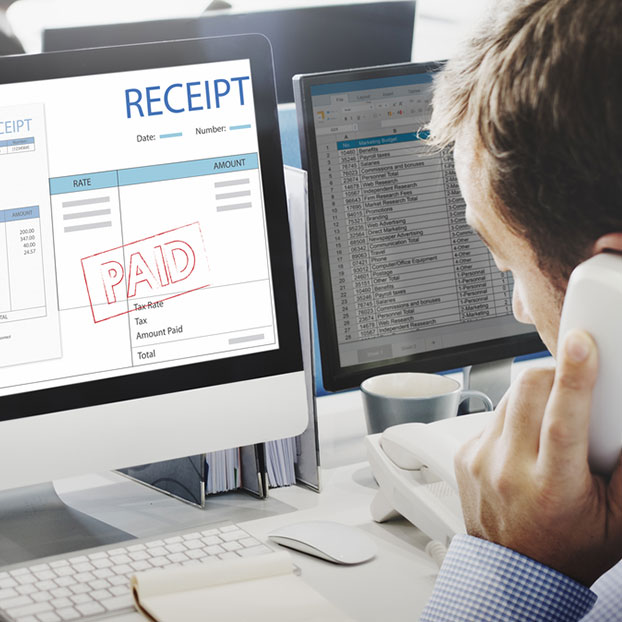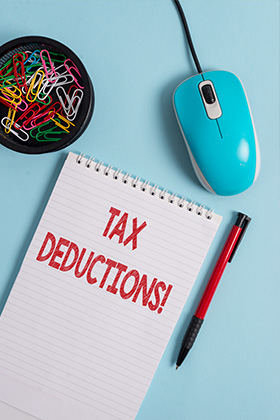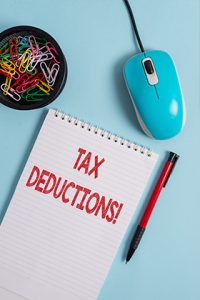
Business Advisory
Business Advisory Services
Everything you need to help you launch your new business entity from business entity selection to multiple-entity business structures.

Everything you need to help you launch your new business entity from business entity selection to multiple-entity business structures.

Designed for rental property owners where WCG CPAs & Advisors supports you as your real estate CPA.

Everything you need from tax return preparation for your small business to your rental to your corporation is here.

Fermentum aliquet amet
tristique purus vitae. Adipiscing
id rhoncus quisque mauris amet.
Table Of Contents

 Small business tax deductions are critical for reducing taxable income. The tax code and the IRS basically say, “Hey, we are cool with deducting business expenses provided you are attempting to earn a profit which we will one day tax nicely.” Knowing the rules is one thing. But being reasonable within the small business tax deduction is just as important.
Small business tax deductions are critical for reducing taxable income. The tax code and the IRS basically say, “Hey, we are cool with deducting business expenses provided you are attempting to earn a profit which we will one day tax nicely.” Knowing the rules is one thing. But being reasonable within the small business tax deduction is just as important.
What happens if you are unreasonable? Good question… think of your last argument with someone who was unreasonable. Was that pleasant? Did the argument end up being resolved amicably? Probably not on both counts. The IRS and tax court are full of humans, and humans respond to unreasonableness in a predictable way… they simply toss out whatever small business tax deduction you are arguing, ask for all kinds of proof, and then look at whatever evidence you do provide with extreme suspicion… a “Yeah… riiiiiggght” salvo.
Don’t get us wrong… just because your business tax deduction appears reasonable does not mean you don’t have to support it with proper record keeping. You must be able to prove the veracity of the tax deduction if challenged. But… what we are conveying here is the level of suspicion and possible derision when your deduction is unreasonable. Don’t you love the word derision… like Pink Floyd type of derision.
Let’s run through some unreasonable small business tax deductions, shall we? Basic assumptions are that these tax write offs are ordinary and necessary. We have an entire webpage dedicated to small business tax deductions, but briefly ordinary means the expense is common and accepted in your trade or profession, and necessary means the expense is helpful and appropriate for you to operate or perform your trade or profession.
A client submitted mileage information for the maintenance and upkeep of his rental property. Seems reasonable, right? You need to pop in from time to time to unclog the toilet or mend the fence. The mileage was 4,592 miles which didn’t seem too high compared to the 18,000 or so miles driven for the year.
However, the zip code of the rental property was the same as the taxpayer’s primary residence. A quick maps search yielded that the rental property was 3.7 miles away from his home. Even quicker math yielded that to accumulate 4,592 miles, the rental property owner would have had to made 1.7 round trips every day of the year. That seemed unlikely.
Sure, we leave room for the long-distance rental. You could easily rack up 4,592 miles by driving from Colorado Springs to San Diego twice a year. But a rental property in your same zip code, probably not. Do you think a mileage log showing 1.7 round trips per day will be viewed favorably? Or be viewed as fabricated? Be reasonable people!
A client turned in a summary of business meals totaling $1,663 and the business earned about $550,000 before expenses. A small business tax deduction of $1,663 mixed in with hundreds of thousands of dollars in business expenses sort of slips into the noise category, right? But! This was a roofing business. And not some big roofing business, but a one-person show with a small crew.
When is the last time your roofer took you out to lunch? When is the last time any contractor for that matter took you out to lunch to discuss business? Meals expense as a small business tax deduction in the roofing business seems odd. When asked, the owner replied with, “those are my meals that I eat every day while working.” Bummer. Wrong answer.
Had the owner replied with, “I have several general contractors that I take out to lunch from time to time to discuss business matters, and to let them know I appreciate their business.” Since the amount is small and seems reasonable with the previous statement, we would have probably replied with, “and you have receipts documenting this business expense, correct?” An “of course” would have been met with moving onto the next issue.
While this example is not unreasonable on its face, it certainly could appear unreasonable given the facts; a small roofing business where the daily average expenditure was $6.65 based on 250 days totaling $1,663 sounds a lot like a business meal for the owner.
Far too often we see cell phone expense being deducted 100% as a small business tax deduction; and not only 100% but also the spouse’s cell phone and the children too! First, we do not care how many phone calls you receive on your cell phone. The minute your spouse texts you and says, “hey sugar plum, pls pick up some milk and eggs. And u r out of beer” your cell phone is not 100%.
Let’s not forget the calls to Mom while driving. Let’s not forget the big poker night that you are hosting and trying to piece together a guest list. Heck, people don’t even have land lines anymore.
Be reasonable people! Your cell phone is not 100% business use unless you have another cell phone. In today’s 24/7 plugged-in world, this is unreasonable. WCG uses a soft firm-wide limit of 80% based on the facts and circumstances. For example, a realtor is probably close to 80%. A dentist is probably 30%. Of course your mileage might vary (another way of saying your facts might be different).
Every once in a while we get a small business owner who claims to have a 1,000 square foot home office. Unreasonable? Who knows… and it begs further investigation. The one that is common is where the business owner has an office in the basement, but the basement isn’t compartmentalized into bedrooms, game room, family room, etc. While the one big space might comprise of 1,000 square feet, it could be viewed as unreasonable for an IT consultant with a laptop.
But! Take this same business owner in this big singular space and make him or her an interior designer, that might change things a bit. Interior designers have all kinds of samples, boards and other odd ball things that could easily take up 1,000 square feet. How about the Amazon retailer who inventories stuff? How about the attorney who just semi-retired and doesn’t need a big office downtown? He or she might decide to use the 1,000 square feet as client storage for files plus the desk.
Just because something initially appears unreasonable, there might be facts and circumstances that changes the color of the small business tax deduction. Here are some additional blog posts for your reading pleasure-
Every once in a while we see a client with 5 cars listed as business cars, and no they do not run a taxi service. Is this unreasonable? Perhaps. If every car you own is listed as a business car, regardless of varying business use percentages, you will have a very large rock going up a very steep hill under an IRS audit. Frankly we have declined engagements with business owners who do this; the tax and accounting profession is self-policing and we are fellow citizens in a wonderful country. We leave room for the exceptions, but if the business owner doesn’t have a reasonable explanation why 5 cars is needed for a one-person consulting gig, and further insists it is ordinary and necessary, we will pass as his or her CPA firm. Pay your fair share of taxes; just not a dollar more.
Below are some additional resources for your business car decision-making including owning it personally versus the business, and the calculation of depreciation.
Most small business owners are not Google, and do not have hundreds of institutional investors that they need to keep happy to prevent the stock from getting shorted and then distorted. If you are Google, shareholder meetings in Fiji might make sense. But take your one-person or even a closely-held business among a handful of shareholders, and a trip to Fiji might be viewed as unreasonable.
Big meals including fancy wine might also be viewed as lavish or extravagant. Here is the blurb from IRS Publication 463–
Lavish or extravagant. You can’t deduct expenses for meals that are lavish or extravagant. An expense isn’t considered lavish or extravagant if it is reasonable based on the facts and circumstances. Meal expenses won’t be disallowed merely because they are more than a fixed dollar amount or because the meals take place at deluxe restaurants, hotels, or resorts.
So there is some wiggle room in there. A business meal for four at Aspen’s Steak House No. 316 with a round of Pappy Van Winkle and a Malbec might be ok at $800. Then again it might not be. All depends on the other human sitting across the table, and what they perceive as unreasonable when reviewing your small business tax deductions. Warren Buffet might agree that gas over $5 a gallon is unreasonable, but a $17,000 bottle of 25 year old Pappy might seem inexpensive.
The philosophy at WCG is straight-forward. We say, don’t be afraid of an audit. Don’t be afraid of losing an audit. But be very afraid of having an unreasonable position when it comes to your small business tax deduction. The IRS can let some things slide; we’ve seen it many times. But if you are unreasonable, they will dig in for the long-haul making you wish you had submitted a different tax return.
Jason Watson, CPA is the Managing Partner of WCG Inc., a business consultation and tax preparation CPA firm located in Colorado Springs, and is the author of Taxpayer’s Comprehensive Guide on LLC’s and S Corps which is available online and from average retailers.

Learn about important tax deadlines, document due dates, and other business tax return info.

Learn about important tax deadlines, document due dates, and other business tax return info.
Table Of Contents

Lorem ipsum dolor sit amet, consectetur adipiscing elit, sed do eiusmod tempor incididunt ut labore et dolore magna aliqua.

Lorem ipsum dolor sit amet, consectetur adipiscing elit, sed do eiusmod tempor incididunt ut labore et dolore magna aliqua.
Did you want to chat about this? Do you have questions about Be Reasonable People!? Let’s chat!
The tax advisors and business consultants at WCG are not salespeople; we are not putting lipstick on a pig expecting you to love it. Our job remains being professionally detached, giving you information and letting you decide within our ethical guidelines and your risk profiles.
We see far too many crazy schemes and half-baked ideas from attorneys and wealth managers. In some cases, they are good ideas. In most cases, all the entities, layering and mixed ownership is only the illusion of precision. As Chris Rock says, just because you can drive your car with your feet doesn’t make it a good idea. In other words, let’s not automatically convert “you can” into “you must.” Yes, it is fun to brag about how complicated your world is at cocktail parties, but let’s not unnecessarily complicate it for the bragging rights.
We typically schedule a 20-minute complimentary quick chat with one of our Partners or Senior Tax Professionals to determine if we are a good fit for each other, and how an engagement with our team looks. Tax returns only? Business advisory? Tax prep, and more importantly tax strategy and planning?
Should we need to schedule an additional consultation, our fee is $250 for 40 minutes. Fun! If we decide to press forward with a Business Advisory or Tax Patrol Services engagement, we will credit the consultation fee towards those services.

Taxes are complicated. We make them simple. Get in touch with a pro here at WCG!

Everything you need to help you launch your new business entity from business entity selection to multiple-entity business structures.

Designed for rental property owners where WCG CPAs & Advisors supports you as your real estate CPA.

Everything you need from tax return preparation for your small business to your rental to your corporation is here.

Fermentum aliquet amet
tristique purus vitae. Adipiscing
id rhoncus quisque mauris amet.
